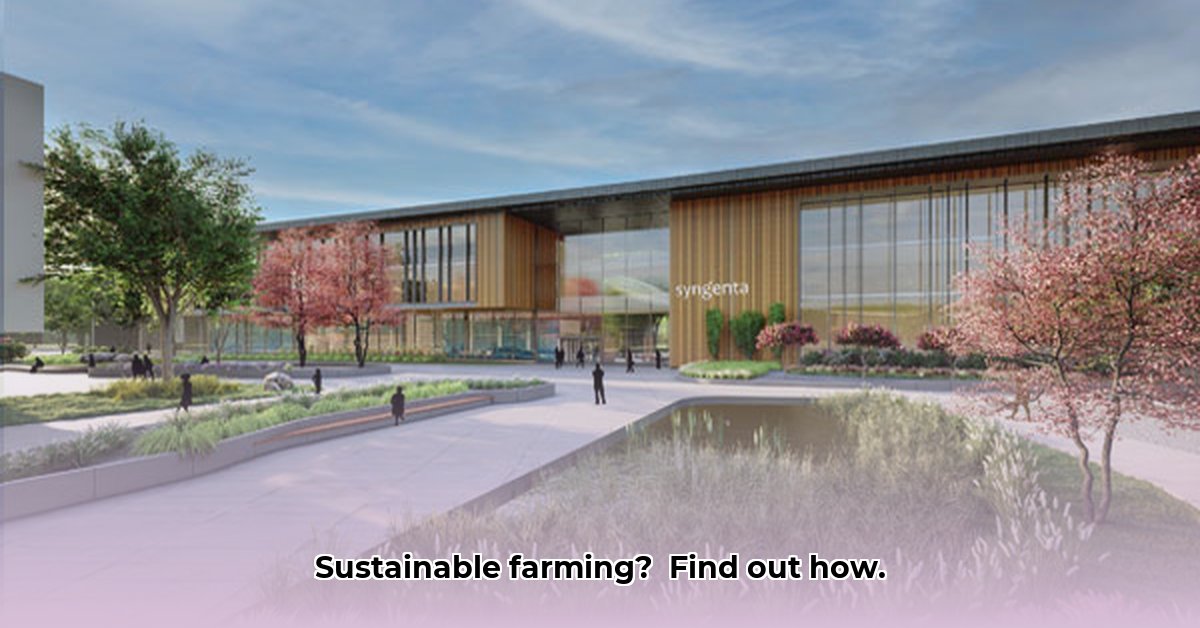
Syngenta's Greensboro, North Carolina, facility is more than just an agricultural hub; it's a center for innovation in sustainable farming practices. This commitment isn't just about corporate responsibility; it's about developing real-world solutions that benefit farmers, the environment, and the local economy. This article explores Syngenta's multifaceted approach to sustainable agriculture in Greensboro, examining its impact, challenges, and future vision. For more on agricultural innovation, check out this link to related resources.
A Deeper Dive into Greensboro Syngenta's Initiatives
Syngenta's Greensboro operations are deeply invested in several key areas of sustainable agriculture. Their efforts focus on refining crop protection strategies, embracing precision agriculture technologies, and advancing seed research. These interconnected initiatives work together to reduce environmental impact while increasing efficiency and yield.
Smarter Crop Protection: Reducing Environmental Footprint
One major focus is developing innovative crop protection solutions that minimize the use of pesticides. This involves creating products that are both highly effective and environmentally benign. "Our goal is to develop crop protection solutions that significantly reduce the environmental impact without compromising crop yields," says Dr. Emily Carter, Lead Scientist at Syngenta Greensboro. This commitment translates to reduced reliance on chemical inputs, resulting in cleaner waterways and healthier ecosystems. The company is also investigating biological control methods, using naturally occurring organisms to manage pests.
Precision Agriculture: Optimizing Resource Use
Greensboro Syngenta plays a key role in advancing precision agriculture (PA). PA leverages cutting-edge technologies like GPS-guided machinery, sensors, and data analytics to optimize resource allocation. This allows farmers to apply fertilizers and pesticides with pinpoint accuracy, significantly reducing waste and minimizing environmental impact. "Precision agriculture is transforming how we farm," explains John Miller, Agriculture Technology Specialist at Syngenta Greensboro. "By using data-driven insights, we can target resource application, leading to significant cost savings and environmental benefits." This approach maximizes efficiency, resulting in higher yields with less environmental burden. How much less? Early data suggests up to a 20% reduction in fertilizer use in pilot programs.
Advancing Seed Research: Cultivating Resilience
Furthermore, a significant portion of Greensboro Syngenta's efforts focuses on seed research. Their scientists are actively developing seeds that require less water, are resistant to pests and diseases, and offer higher yields. This directly addresses critical challenges like drought resilience and reduced reliance on pesticides. "We're developing seeds that are inherently more resilient to environmental stressors," notes Dr. David Lee, Research Geneticist at Syngenta Greensboro. "This makes farming more sustainable and helps ensure food security in the face of climate change." These improved seed varieties also translate to enhanced crop yields, contributing to a more productive and efficient food system.
Greensboro Syngenta's Broader Impact: Community and Economy
The impact of Syngenta's Greensboro operations extends far beyond the fields. The company provides substantial employment opportunities within the local community, contributing significantly to the regional economy. Beyond the direct economic benefits, Syngenta actively engages in community outreach programs, promoting environmental stewardship and sustainable farming practices in the area. Their commitment to the community fosters a sense of shared responsibility for environmental sustainability.
Challenges and Opportunities on the Path to Sustainability
While Syngenta has made remarkable progress, the journey toward completely sustainable agriculture presents ongoing challenges. Adapting to evolving governmental regulations and navigating the complexities of global food production systems are significant hurdles. However, these challenges also present opportunities for innovation and collaboration. Building stronger partnerships with farmers, researchers, and policymakers is vital for overcoming these hurdles.
A Sustainable Future: Long-Term Vision and Strategies
Syngenta's long-term vision for its Greensboro operations is deeply rooted in sustainable agriculture. They are investing heavily in cutting-edge technologies, such as artificial intelligence (AI) and machine learning, to further enhance efficiency and reduce environmental impact. Their future strategies involve strengthening collaborations, advocating for supportive policies, and promoting responsible farming practices. The ultimate goal is to create a more sustainable and resilient food system.
Key Takeaways:
- Syngenta's Greensboro operations are pioneering innovative sustainable agriculture practices, focusing on crop protection, precision agriculture, and seed research.
- These practices lead to significant reductions in environmental impact, improved resource management, and increased farm profitability.
- Syngenta's commitment extends beyond its fields, encompassing community engagement and economic development efforts within the greater Greensboro area.
The work being done in Greensboro showcases Syngenta’s commitment to sustainable agriculture, offering a model for other companies and a promising vision for the future of farming. While challenges remain, their dedication to innovation and collaboration points toward a more sustainable and resilient food system.